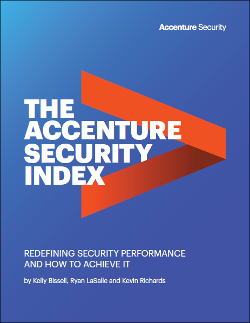Ungated Post | 07 Mar 2017
The Accenture Security Index

We surveyed 2,000 executives from 12 industries and 15 countries across North and South America, Europe and Asia Pacific. The objective was to understand the extent to which companies prioritize security, how comprehensive security plans are, how resilient companies are with regard to security, and the level of spend for security.
The survey aimed to measure performance across 33 cybersecurity capabilities classified into seven cybersecurity domains: business alignment, cyber response readiness, strategic threat intelligence, cyber resilience, investment efficiency, governance and leadership, and the extended ecosystem. More than 60% of respondents were senior security executives at director level and above with responsibility for cybersecurity strategy and spending at companies with revenues of US$1 billion or more.
Oxford Economics’ team is expert at applying advanced economic tools that provide valuable insights into today’s most pressing business, financial, and policy issues.
To find out more about our capabilities, contact:
Americas
Diantha Redd
+1 (646) 503 3052
Email
Asia Pacific
Peter Suomi
+65 6850 0110
Email
EMEA
Aoife Pearson
+44 (0)203 910 8054
Email
Related Services

Post
The economic impact of abandoning the WTO
Oxford Economics have been commissioned by the International Chamber of Commerce (ICC) to provide an independent assessment of the economic impact of WTO dissolution. This report details our findings and the assumptions underpinning our analysis.
Find Out More
Post
The economic impact of the sports activities of public service media
This study shows how the sports activities of public service media supported €4.5 billion of GDP and 57,000 jobs across 31 European countries in 2022. The report also highlights wider economic benefits of public service media sports coverage, such as the way in which it leverages sponsorship income for sports bodies.
Find Out More
Post
Global Trade Education: The role of private philanthropy
Global trade can amplify economic development and poverty alleviation. Capable leaders are required to put in place enabling conditions for trade, but currently these skills are underprovided in developing countries. For philanthropists, investing in trade leadership talent through graduate-level scholarships is an opportunity to make meaningful contributions that can multiply and sustain global economic development.
Find Out More